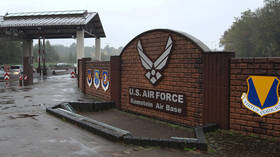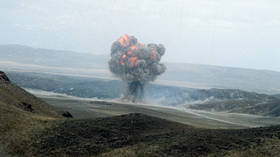China tells US to withdraw nukes from Europe

The US should “withdraw all its nuclear weapons from Europe and refrain from deploying nuclear weapons in any other region,” the director general of the Chinese Foreign Ministry's arms control department has said.
So-called “nuclear sharing arrangements” between countries “increase the risks of nuclear proliferation and nuclear conflicts,” Fu Cong said on Tuesday, during the 10th Review Conference on the Treaty on the Non-Proliferation of Nuclear Weapons at the UN headquarters in New York.
States that do not possess nuclear weapons should stop “instigating nuclear sharing or other forms of nuclear deterrence arrangements,” the official added.
Fu Cong also called on the international community to “reject double standards in the area of non-proliferation.”
The Chinese arms control official referred to the AUKUS pact between the US, UK and Australia, aimed at arming Canberra with nuclear-powered submarines, as an example of such a double standard, which “poses severe nuclear proliferation risks.”
“Any attempt to replicate the NATO’s nuclear sharing model in the Asia-Pacific region would undermine regional strategic stability and would be firmly opposed by the countries in the region and, when necessary, face severe countermeasures,” he warned.
Fu also urged the US to completely lift its “illegal” sanctions on Iran in order for the 2015 nuclear deal to be revived, and for Tehran to return to full compliance with its obligations.
Speaking about the “complex and severe” situation around the North Korean nuclear program, he insisted that a “dual track approach and the principle of phased and synchronized actions” should be pursued on the way to achieving the goal of denuclearization on the Korean Peninsula.
As for China, it is ready to cooperate with all countries to strengthen nuclear non-proliferation, the official said, adding that Beijing does not compete with other countries’ arsenals, and keeps its nuclear stockpile at the minimum level required to protect national security, Fu insisted.
“China will under no circumstances be the first to use nuclear weapons,” he assured.
The Treaty on the Non-Proliferation of Nuclear Weapons (NPT) is a key international agreement aimed at preventing the spread of nuclear weapons and technology, promoting cooperation in the peaceful uses of nuclear energy, and facilitating nuclear disarmament.
Since being established in 1968, it has been joined by 191 countries, including the five officially nuclear-armed states – the US, Russia, the UK, France and China.













